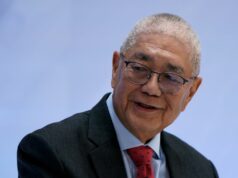Razon’s firm stopped from taking over PECO assets
A MANDALUYONG court has declared sections of the law that granted Razon-led MORE Electric and Power Corp. a franchise as a distribution utility in Iloilo City as void and unconstitutional for infringing on the right of the area’s existing electricity distributor Panay Electric Co., Inc. (PECO) to due process and equal protection of the law.
“Wherefore, premises considered, judgment is hereby rendered declaring Sections 10 and 17 of RA No. 11212 void and unconstitutional for infringing on PECO’s rights to due process and equal protection of the law,” reads the dispositive portion of the judgment made by Monique A. Quisumbing-Ignacio, presiding judge of Branch 209 of the Mandaluyong City Regional Trial Court (RTC).
Republic Act No. 11212 was signed into law on Feb. 14, 2019, granting MORE a franchise to establish, operate and maintain a distribution system in the city of Iloilo.
“Consequently, PECO has no obligation to sell and respondent has no right to expropriate PECO’s assets under Sections 10 and 17 of RA No. 11212; and, PECO’s rights to its properties are protected against arbitrary and confiscatory taking under the relevant portions of Sections 10 and 17 of RA No. 11212,” the court order stated.
Section 10 authorizes MORE to exercise the power of eminent domain and acquire such private property as is actually necessary for the realization of the purpose for which the franchise is granted.
Section 17 states the power of MORE, as grantee, to effectively acquire power distribution assets. The distribution assets that exist within the franchise area could only refer to those of PECO.
The case was filed by PECO against defendants MORE, Department of Energy, Energy Regulatory Commission and all other agencies tasked to implement RA No. 11212.
The court also made permanent the temporary restraining order dated March 14, 2019 enjoining respondent MORE and/or any of its representatives from enforcing, implementing and exercising any of the rights and obligations set forth under RA 11212.
The rights that had been blocked by the court include commencing or pursuing the expropriation proceedings against petitioner PECO under the assailed provisions; and takeover by respondent MORE of PECO’s distribution assets in the franchise area.
The court decision was dated July 1. It was distributed to reporters on Tuesday, July 9.
The presiding judge said that in a long line of cases, the Supreme Court has defined “the power of eminent domain” as the power of the State to acquire private property for some public purpose.
“Although the power partakes of a sovereign character, it is by no means absolute,” the judge said.
For a valid exercise of the right of eminent domain, it is necessary that the property sought to be taken is not being devoted to the particular public use contemplated by the expropriation body, the decision read.
It stated that the power of eminent domain was never intended to be used as a tool to take private property already being devoted to public use from one person and transfer the same to another to be used for the same purpose.
“It does not achieve the ultimate end of eminent domain which, to repeat, is to meet a public need or public exigency,” it added.
PECO’s properties are already being devoted to public use, that is, for power distribution, thus the only tangible effect of the exercise of eminent domain by virtue of the assailed provisions would be to replace PECO with MORE as the owner of the existing distribution system.
The court points out that what it is discussing as unconstitutional is the transfer of all of PECO’s distribution assets existing at the franchise area by virtue of the exercise of the right of eminent domain as provided for in the assailed provisions.
“The grant of the franchise is another matter which is not the issue in the present petition,” it says.
Sought for comment, MORE Power legal counsel Hector P. Teodosio said they will file an appeal either before the Court of Appeals or the Supreme Court.
At the same time, Mr. Tedosio said the decision of the Mandaluyong RTC has no serious effect on the expropriation case they filed before the RTC Branch 37 in Iloilo City to acquire PECO’s assets.
“There is no serious effect because ang (the) RTC of Iloilo City where the expropriation is filed, is an independent and co-equal court,” he said yesterday.
On the other hand, PECO Administrative Manager Marcelo U. Cacho, in a press conference on Tuesday, said they will continue the legal fight while giving assurance that their customers will be given utmost priority.
“The (Mandaluyong) RTC confirms that one cannot legislate the illegal takeover of a private company lock stock and barrel in the guise of expropriation. We know that this decision will not stop our adversary but we are committed to keep up the fight and defend our rights under the constitution. PECO reaffirms the commitment we have given time and time again never to abandon Iloilo City —even as we keep up the fight,” Mr. Cacho said.
He added that PECO will be refiling their franchise renewal application before the House of Representatives once the 18th Congress opens on July 22.
PECO was granted a 25-year franchise in 1968 by virtue of RA No. 5360. The franchise was extended by another 25 years in 1994. The company was the only operator in the power distribution history of Iloilo City. It filed an application for renewal on July 22, 2017 in anticipation of the expiration of its legislative franchise by January 2019. — Victor V. Saulon with a report from Emme Rose S. Santiagudo



